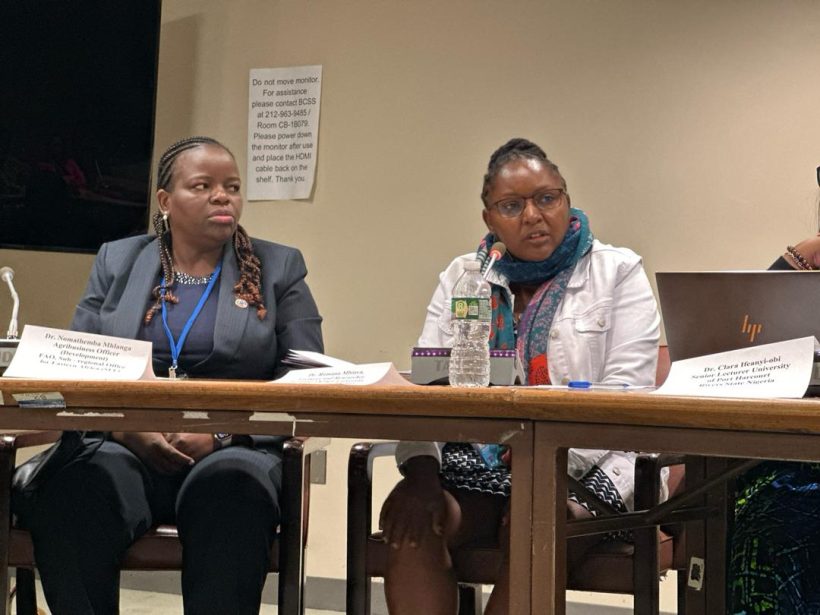
Romana Mbinya (right) is a Lecturer and Researcher at Kenya’s Jaramogi Oginga University of Science and Technology, where her area of interest is agricultural extension and rural development. As a beneficiary of the African Women in Agricultural Research and Development (AWARD’s) Gender Responsive Agriculture Systems Policy (GRASP) Fellowship, her policy focuses on identifying gender gaps in agricultural extension and enabling more equitable access to advisory services. She was selected to speak at the 68th Commission on the Status of Women (CSW68) in New York by AWARD – an experience that has left her feeling inspired and confident in her work.
I waited over 10 years to meet the minimum qualifications to apply for an AWARD Fellowship. I had signed up for the AWARD newsletters, read the blogs, and listened to the podcast; I was hooked. I immediately started my application when I saw the announcement that they were seeking Fellows to join their new GRASP program; I bet I was the first to apply.
The policy program closely mirrored my PhD research on addressing the policy challenges faced by agricultural extension in Kenya. Fast-forward to the evening of January 3rd, 2024, when I received an email from AWARD indicating that I had been nominated amongst other Fellows to attend and speak at the CSW68 conference in New York.
I froze! Going to the United States had been a lifelong dream.
Being in New York was exhilarating. I must confess that I fell in love with the city’s mass of people, magnificent tall buildings, delicious street food, and countless shopping opportunities. Getting the opportunity to attend the UN headquarters was a dream come true. When I got my entry pass to CSW68, I felt important and empowered, and I wore it with pride. The staff and other attendees were warm, engaging, and excited as I was.
I learned so much from the various side events that addressed issues on gender and agriculture, climate change, resources, and social protection. Two ‘aha’ moments particularly stuck out for me: the interconnectedness of most gender issues.
For instance, one session I attended discussed the burden of unpaid care work for women, the challenge women face in accessing land, and how these issues – when combined – significantly impact women’s contribution to the agri-food system.
I also learned that while promoting women’s empowerment, it is imperative to recognize and redistribute care work among household members and reward/remunerate women for that contribution. As the event proceeded, I could not stop thinking about how these learnings related to my own work in helping women access extension services.
The second key takeaway came from a session on gender-based violence and its connection to hunger, poverty, and climate change. A team from Lesotho presented this and was a real eye-opener – for instance, they explained that violence against women costs 5.3% of the country’s GDP.
I could not believe this figure. I also learned that the team promotes livelihood opportunities such as beekeeping, which has long been a man’s job, in rural communities to break rigid social, economic, and political norms. The project has successfully enhanced cooperation between men and women and effectively reduced incidences of gender-based violence across four districts.
In addition to attending these insightful sessions, I felt most privileged to speak and share my story at the AWARD side event. Through the Fellowship, I have been working to develop a Policy Innovation Project (PIP) with my AWARD Policy Mentor to review the National Agricultural Extension Policy to make it gender-responsive.
As I spoke about this at the event, I could see the audience nodding along, which gave me confidence that my story resonated. An audience member from the World Food Program (WFP) asked me how women farmers in patriarchal societies—whom extension services providers typically bypass—can be better supported in times of social crisis, such as the loss of their husbands.
This challenged my thinking and raised an important consideration that is currently missing from my PIP. It also reinforced what we learned from our GRASP trainers about the importance of disaggregating data to go beyond the legal sex demographics to include other gender markers such as marital status and age.
All the AWARD Fellows who attended CSW inspired me so much. We had worked hard to achieve our career ambitions as agricultural researchers, and whilst our journey had been tough, we all agreed it had been worth the fight. I spent the most time with Pamela Afokpe, a Beninese candidate for AWARD’s One Planet Fellowship. Pam is a phenomenal woman.
She is a young mother, a wife, a researcher, and a PhD student studying in the Netherlands. Despite wearing all these hats, she excels in academics and indigenous vegetable research. Along with colleagues, I had previously written a grant proposal to research neglected indigenous vegetables, but the submission was unsuccessful. Talking to Pam has inspired me to retrieve the proposal and rework it to apply for other funding opportunities.
Overall, I came from CSW feeling empowered and that my effort to make extension policies gender responsive is meaningful, valuable, and impactful. I want to thank the AWARD team for their encouragement and the opportunity. The fellowship has exceeded my expectations on all fronts!

